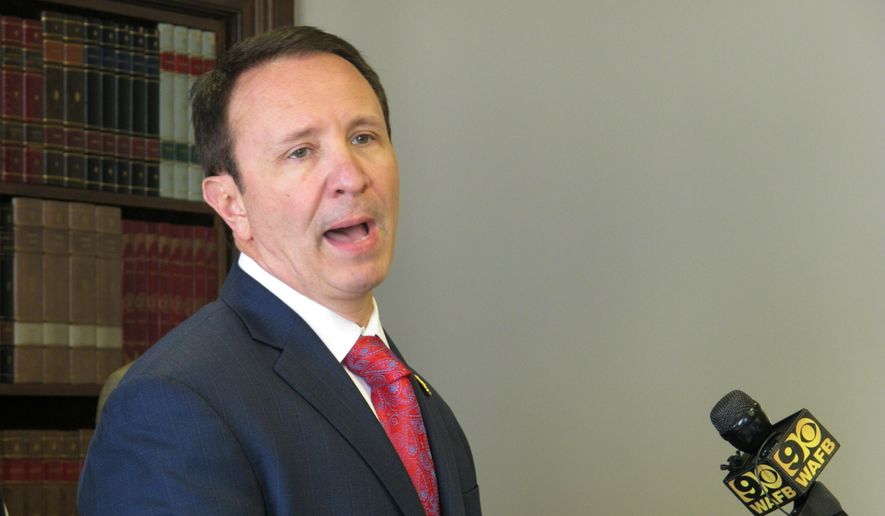If the states are the laboratories of democracy, then the Republican Party has an Obamacare alternative in a test tube wending its way toward the governor’s desk in Louisiana.
The momentous-sounding Health Care Coverage for Louisiana Families Protection Act would use high-risk pools to cover residents struggling with pre-existing conditions — an issue that has bedeviled Republicans in Washington.
In Louisiana, though, the Republican idea won backing from both parties and cleared the state Senate on Monday evening on a 38-0 vote.
It now heads toward near certain approval in the state House, where the speaker is a co-sponsor, and would then reach the desk of Gov. John Bel Edwards, a Democrat who will face a tricky election-year decision of whether to sign or veto the bill.
State Attorney General Jeff Landry, a former Republican congressman, has spearheaded the effort, saying it would inject real competition into the health insurance market, reduce costs for consumers and provide a safety net for those whose pre-existing conditions, such as cancer and diabetes.
“What we’re doing is going back to federalist principles, working within the long-established powers of the state,” Mr. Landry said. “It will be interesting to see what the governor will do.”
The bill is meant to be an Obamacare replacement, poised to go into effect should a Republican-led lawsuit against the 2010 federal health care law succeed. Mr. Landry is one of the Republican state attorneys general taking part in that challenge.
The bill would call for Louisiana’s insurance commission to open the insurance market to anyone not covered by an employer’s plan.
Following carefully crafted rules, insurance companies and the state commissioner would determine who belongs in a high-risk pool, what the bill’s sponsors repeatedly stress as a “guaranteed benefits pool.” The key is that buyers would not know who is in the pool.
That pool would be funded through a monthly charge on every policy sold and with money the state pays Washington through a niche in Obamacare regulations.
“We have a real opportunity here to be the first in the nation to recognize what we all know is true: that the Affordable Care Act is unaffordable and does not work,” Mr. Landry said. “This will put things back in the consumer’s hand.”
There are still questions, such as where some of the money to run the program would come from. State officials hope to tap tens of millions of dollars in Affordable Care Act subsidies that would be freed up if the law is struck down.
Mr. Edwards’ counterproposal was shot down in committee last week.
The governor, meanwhile, has attacked Mr. Landry’s bill in local media accounts, saying it would be too expensive and would endanger what he claims are 850,000 state residents with pre-existing conditions, more than 18% of the population.
His staff reiterated that figure Tuesday when discussing his views with The Washington Times. While Mr. Edwards has not decided whether he will approve or veto the measure, he remains convinced that Mr. Landry created an issue where none existed.
“The governor identified this issue last year, after it was discovered that the attorney general entered the state into a lawsuit without consulting state officials and as a result has now jeopardized health care of nearly 850,000 Louisianans with pre-existing conditions,” spokeswoman Christina Stephens said.
Mr. Landry said that figure is wildly inflated.
“He must be using Common Core math,” said Mr. Landry, who this year ruled out running against Mr. Edwards. “This would only involve individuals and the individual market. This has always been an issue over individuals. That means the real number is 90,000 people. That’s what we’re talking about.”
While Mr. Landry mocked what he regards as the governor’s inflated math, Mr. Edwards’ office insisted the governor’s 850,000 figure has a reputable source: the Kaiser Family Foundation, which used that for Louisiana in 2015.
The larger number is important because some people covered by employer plans today could join the individual market in the future and perhaps have difficulty getting coverage, Ms. Stephens said.
Creating high-risk pools is not a new idea.
Congressional Republicans have floated it as an alternative to universal government-sponsored care, saying it would preserve the employer-based model that works for most Americans while creating a safety net for others who aren’t covered by their jobs and can’t take advantage of Medicare or Medicaid.
Yet taking preemptive action in the states offers a new rhetorical bullet for Republicans, who were excoriated on the campaign trail in last year’s congressional elections for failing to unify around a national Obamacare replacement plan.
Adam Piper, executive director of the Republican Attorneys General Association, said Mr. Landry has blazed a path for other Republican lawmakers.
“I would predict more states will adopt marketplace-based solutions using this legislation, a model that is customizable to the needs of each individual state,” he said.
Republican policymakers said they modeled the Louisiana bill under a once-successful health care reform package that existed in Maine. Before Obamacare unraveled it, Maine reduced premiums by allowing providers to offer an array of policies.
Republican state Sen. Conrad Appel said Mr. Landry’s bill accomplishes what Louisiana needs to do and provides a ready fill-in should the lawsuit against the Affordable Care Act hold up on appeal.
“In anticipation of national relief from the serious problems created by Obamacare, Louisiana is setting the stage to protect our most vulnerable in a logical way,” Mr. Appel said after Monday’s vote.
Mr. Edwards, though, has embraced Obamacare, and signed up Louisiana for the Medicaid expansion. He said an estimated 450,000 state residents are enrolled in the federal program.
“He’s using the wrong metric there,” Mr. Landry said. “We shouldn’t be measuring our success by how many people we can get enrolled in Medicaid. We should measure real success in terms of how many people we can get off it.”
• James Varney can be reached at jvarney@washingtontimes.com.




Please read our comment policy before commenting.